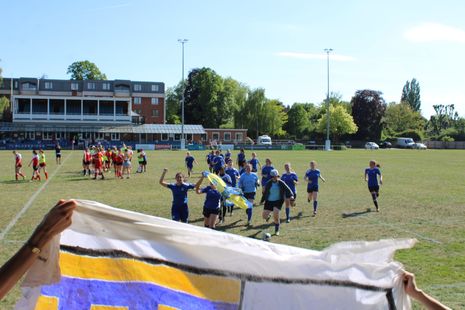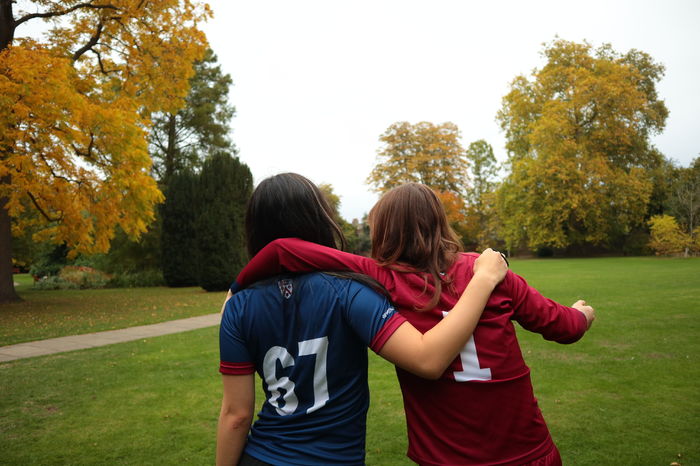Colleges cut support for trans-inclusive football league
Vote comes after colleges cut support for current interim league

Women’s and non-binary college football captains are set to vote next week on whether to exclude trans players, following colleges officially cutting all support for the current interim league.
The current Intercollegiate League was established as an interim measure, while captains sought further consultation on new Football Association (FA) guidance regarding transgender and non-binary eligibility.
Following a meeting on Saturday (22/11) of multiple senior college officials, colleges declared an ‘intercollegiate consensus’ which stated colleges were cutting all support for the current league.
This stated colleges would only support their women’s football teams going forward if they re-established an official league, which is required to be affiliated with the University Sports Centre and follow national guidance on gender divisions.
Varsity spoke to captains and players, who all expressed concern about the impact the ongoing uncertainty was having on student welfare and team culture.
Lara, captain of CUAFC, told Varsity that “there has been a disappointing lack of consideration by the colleges for the trans and queer community of Cambridge – and at the same time a very distinct focus on legal risks”.
Inter-college matches have continued this term in the informal Intercollegiate League which is not affiliated with the University Sports Service, while Cambridge University Amateur Football League (CUAFL) suspended the previous women’s league.
The long-delayed decision on a new league follows the University’s Director of Sport advising earlier this term that the CUAFL must adhere to new FA guidance on trans and non-binary eligibility, which states players must be “biological females” to compete in women’s divisions.
Martine, captain of Sidney Sussex women’s FC, spoke with Varsity about hopes for the new league, stating the “whole idea is we want it to make it as inclusive as possible even within the clearly discriminatory new guidelines”.
On Monday (24/11) evening, a meeting of women’s college captains took place which concluded that the current informal Intercollegiate League will likely need to be disbanded and a new official league, affiliated with the University Sports Centre, would be re-established.
A vote is hoped to be held next week, as the discussions concluded, on whether the gender divisions of the new league will be ‘mixed’ or women’s-only (according to the FA’s trans-exclusive definition).
The University’s requirement for CUAFL to follow FA guidance is in accordance with the ‘Student Eligibility Criteria’ decided by Cambridge’s Sports Committee.
Another college women’s team captain told Varsity, “everyone just wants to play football, but also everyone wants to get it right”.
Some colleges, notably St John’s and King’s, had already cut recognition of their women’s football teams prior to Saturday’s meeting. This included banning the team from playing on college sports grounds, meaning some of the league matches this term had to be played on non-college grounds including Jesus Green.
In a joint statement, St John’s and King’s said:
“Our Colleges remain committed to supporting all students and ensuring that sport is accessible and inclusive. All sporting activity undertaken in a College’s name or on its grounds must be conducted in line with the law and the regulations set by each sport’s national governing body. This approach is in line with the University’s recent guidance.”
“Within this context, we have remained in close dialogue with our women’s football team throughout the term. Funding for women’s football has not been reduced, and our pitches remain available. Competitive fixtures can only take place on College grounds where the sport structure operates within the relevant national governing-body provisions.”
Lara noted that the current league was always intended as an “interim solution,” but that they were pushed to a decision, noting “colleges saying we will not let you use our grounds is an incentive to make active steps towards getting stuff set up”.
The joint statement of college officials also advised the teams that, without college support, individual members would be legally liable for the team.
The statement noted:
“Without College recognition or support (or University recognition or support), any unaffiliated association would in law be regarded as an “unincorporated members’ association” with the individual members taking on significant legal and personal risk, both individually and collectively.”
In an official league, the University would be liable for any legal action taken against the league or individual teams.
One college captain noted, “I’m very unsure about the whole situation” and that “it’s an issue that I don’t think anyone’s really got a solution for”.
Another player highlighted captains’ steadfast commitment, noting that “despite the confusion matches are still going ahead each week and there still seems to be a culture of inclusion”.
Multiple captains reported receiving communication from College Senior Tutors offering guidance on the situation, with many offering their support and help. However, Lara found “there’s been no super active reach out of setting up support”.
Varsity understands multiple captains have expressed intentions to boycott the league if a vote results in a trans-exclusive women’s league under FA guidance.
Discussions around the structure of a potential ‘mixed’ league agreed all genders would be able to play, but that no man who has played in a CUAFC men’s team, or the men’s college football league, would be eligible.
The statement from college officials reads: “The intercollegiate consensus is that where women’s football is being played in the College’s name and/or on the College’s grounds, it should be organised and played within the parameters set by the sport’s governing body.”
The University of Cambridge declined to comment.
 News / Cambridge academics sign open letter criticising research funding changes22 February 2026
News / Cambridge academics sign open letter criticising research funding changes22 February 2026 News / Supporters protest potential vet school closure22 February 2026
News / Supporters protest potential vet school closure22 February 2026 News / University Council rescinds University Centre membership20 February 2026
News / University Council rescinds University Centre membership20 February 2026 News / Hundreds of Cambridge academics demand vote on fate of vet course20 February 2026
News / Hundreds of Cambridge academics demand vote on fate of vet course20 February 2026 Comment / A tongue-in-cheek petition for gowned exams at Cambridge 21 February 2026
Comment / A tongue-in-cheek petition for gowned exams at Cambridge 21 February 2026









